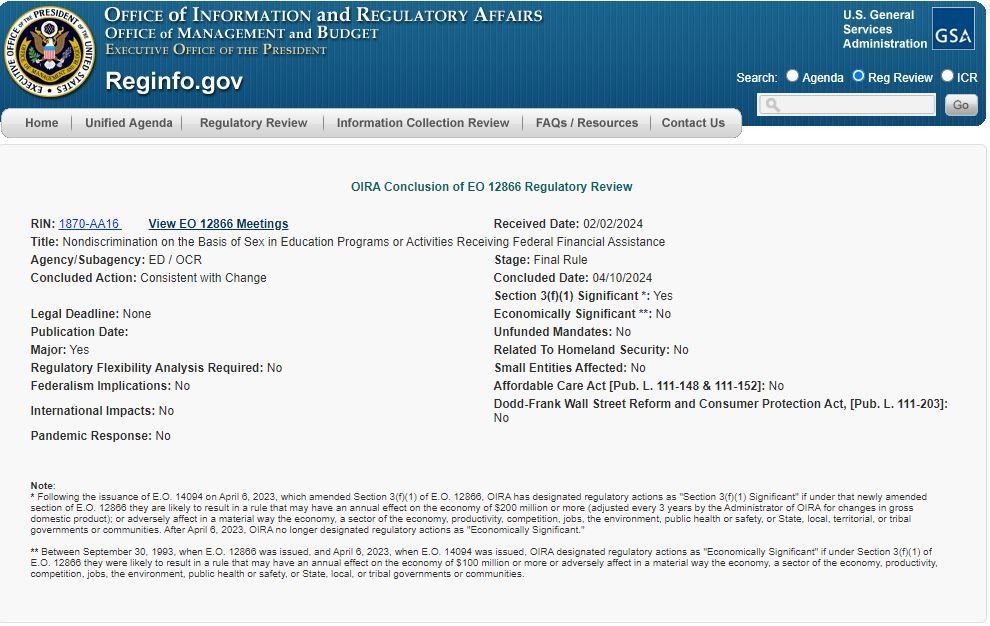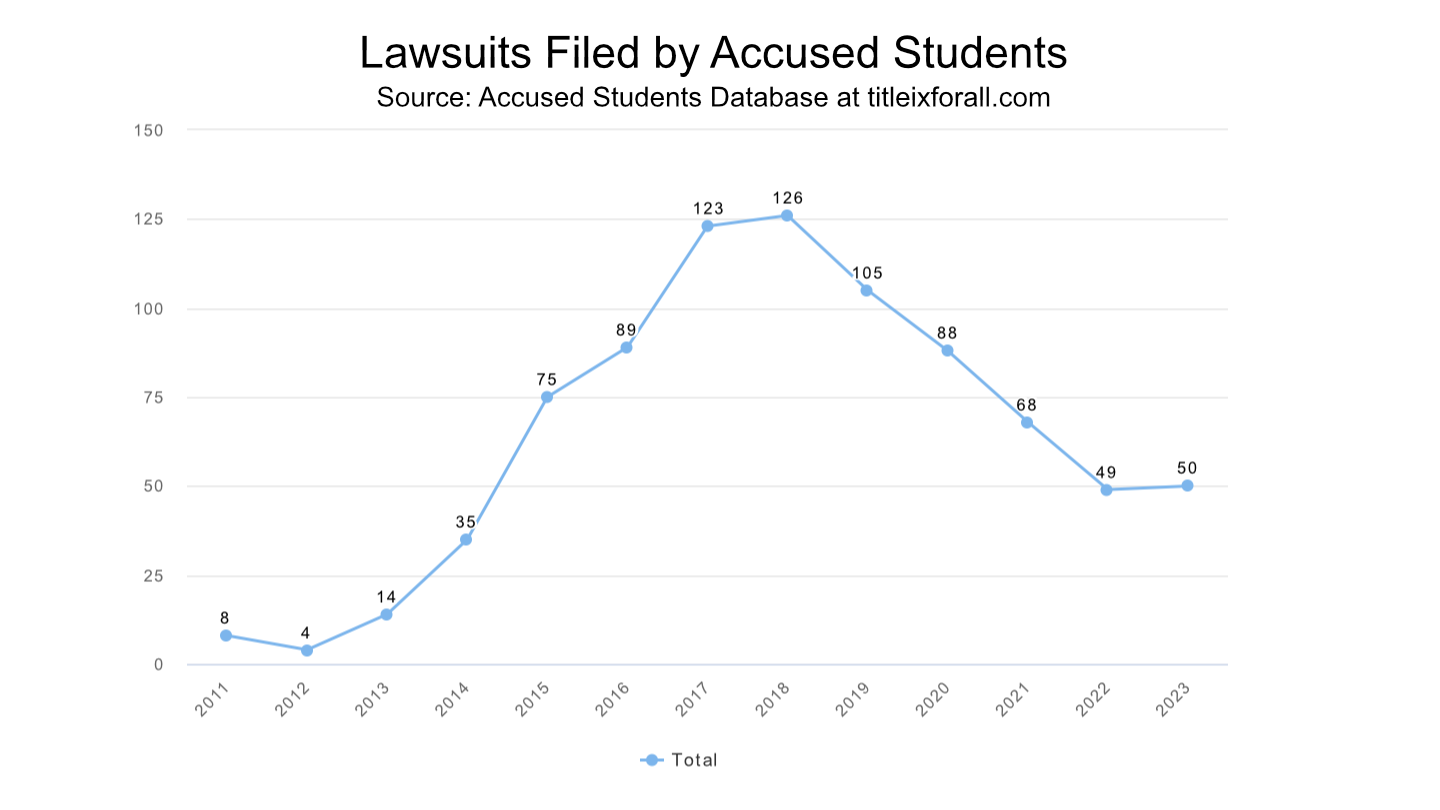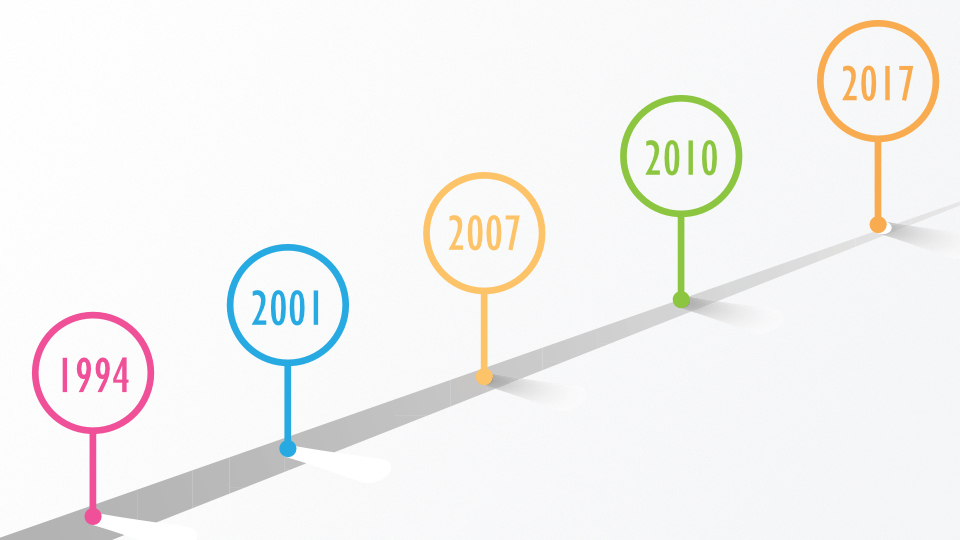Update: read our full guide on what’s changing with the new Title IX regulations.
The Department of Education has released the new Title IX rule. You can read their announcement here. The rule goes into effect August 1, 2024. ED has also provided the following:
- The unofficial version of the final regulations. It is 1,577 pages, most of which respond to comments. The rule begins on page 1,505.
- Fact sheet
- Overview of key provisions
- Resource for drafting school policies
The rule has also been published to the Federal Register.
The final version of the rule contains several of the elements we opposed, such as elimination of the full live-hearing requirement in postsecondary institutions and reduced access to evidence by the parties.
This announcement comes eight days after OMB confirmed they were finished reviewing the new regulations and cancelled the meetings that had been scheduled up until yesterday:
Ironically, this announcement also comes the very same week that accused students have experienced a remarkable string of favorable outcomes in federal court, including the following that we have updated in our Accused Students Database:
- 4/18: Doe v. Hamilton College, college’s motion for summary judgment denied
- 4/17: Doe v. Dartmouth, college’s motion for summary judgment denied
- 4/17: Doe v. Towson University, university’s motion to dismiss denied
- 4/16 – Doe v. University of Maryland, motion to dismiss denied, injunctive relief granted to accused student prohibiting his suspension and allowing him to participate in the graduation ceremony and receive his degree
- 4/16 – Doe v. University of Virginia, settlement
In January, we released our regulatory provision citation and lookup tool. We will review the final version of the regulations and make updates to this tool soon.
The Title IX rule announced today governs misconduct proceedings exclusively. As ED notes in its announcement, “The Department’s rulemaking process is still ongoing for a Title IX regulation related to athletics [and gender identity/trans issues].”
The rule announced today provides universities with greater flexibility, but that flexibility can be abused. Expect that it will be. Consider this the official end of the decline in filings of lawsuits by accused students (graph below), which we discussed here. Look for more comments from us in the near future on the new regulations.
Thank You for Reading
If you like what you have read, feel free to sign up for our newsletter here:
About the Author
Related Posts
Update: read our full guide on what’s changing with the new Title IX regulations.
The Department of Education has released the new Title IX rule. You can read their announcement here. The rule goes into effect August 1, 2024. ED has also provided the following:
- The unofficial version of the final regulations. It is 1,577 pages, most of which respond to comments. The rule begins on page 1,505.
- Fact sheet
- Overview of key provisions
- Resource for drafting school policies
The rule has also been published to the Federal Register.
The final version of the rule contains several of the elements we opposed, such as elimination of the full live-hearing requirement in postsecondary institutions and reduced access to evidence by the parties.
This announcement comes eight days after OMB confirmed they were finished reviewing the new regulations and cancelled the meetings that had been scheduled up until yesterday:
Ironically, this announcement also comes the very same week that accused students have experienced a remarkable string of favorable outcomes in federal court, including the following that we have updated in our Accused Students Database:
- 4/18: Doe v. Hamilton College, college’s motion for summary judgment denied
- 4/17: Doe v. Dartmouth, college’s motion for summary judgment denied
- 4/17: Doe v. Towson University, university’s motion to dismiss denied
- 4/16 – Doe v. University of Maryland, motion to dismiss denied, injunctive relief granted to accused student prohibiting his suspension and allowing him to participate in the graduation ceremony and receive his degree
- 4/16 – Doe v. University of Virginia, settlement
In January, we released our regulatory provision citation and lookup tool. We will review the final version of the regulations and make updates to this tool soon.
The Title IX rule announced today governs misconduct proceedings exclusively. As ED notes in its announcement, “The Department’s rulemaking process is still ongoing for a Title IX regulation related to athletics [and gender identity/trans issues].”
The rule announced today provides universities with greater flexibility, but that flexibility can be abused. Expect that it will be. Consider this the official end of the decline in filings of lawsuits by accused students (graph below), which we discussed here. Look for more comments from us in the near future on the new regulations.
Thank You for Reading
If you like what you have read, feel free to sign up for our newsletter here:
About the Author
Related Posts
More from Title IX for All
Accused Students Database
Research due process and similar lawsuits by students accused of Title IX violations (sexual assault, harassment, dating violence, stalking, etc.) in higher education.
OCR Resolutions Database
Research resolved Title IX investigations of K-12 and postsecondary institutions by the Department of Education’s Office for Civil Rights (OCR).
Attorneys Directory
A basic directory for looking up Title IX attorneys, most of whom have represented parties in litigation by accused students.








